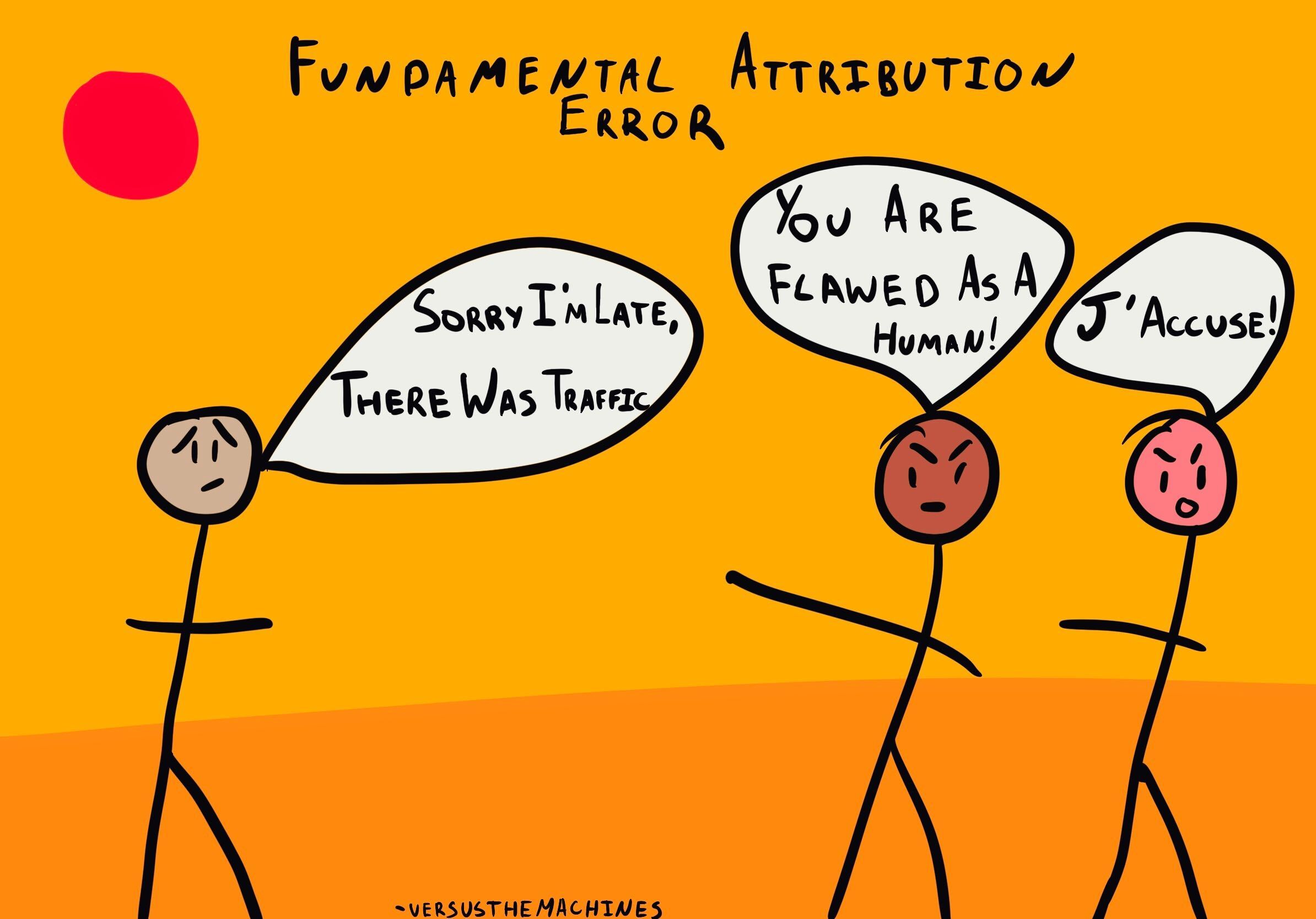Fundamental Attribution Error
Actions Reflect Character Not Situation
Behavior is often no more stable than the situations that shape it
Fundamental Attribution Error - Overview
The
fundamental attribution error is a cognitive bias
that assumes that a person's actions depend on what "kind of person" someone
is rather than on the social and environmental forces that may influence the
person.
The fundamental attribution error overemphasizes personal characteristics and ignore situational factors in judging others’ behaviour.
People who are influenced by this bias tend to regard other people as internally motivated and responsible for their behavior. So for example, they will tend to believe that other people do bad things because they are bad people. Situational factors that might have played a role are ignored.
An example of a fundamental attribution error [averted]
As
a fairly typical UK citizen my knowledge of the sex trade in the UK was
limited to what I read or saw in the media. I tended to think in terms of
the "high-end" escort girls pandering to the wealthy elite and motivated by
their very high earning potential or the other end of the spectrum, sad
and broken women who were drug users living in poverty in the run-down
areas of inner cities.
I
recall when I first starting working in S.E.Asia being totally
surprised at the number of "working girls" plying
their trade in the night clubs, bars and hotels of Singapore and other
cities in the region and and who appeared entirely "normal".
My friend who was inducting me into life as a new ex pat in S.E.Asia noted my surprise and advised me not to be too judgemental.
He said these women are not "whores", not "tarts"
and not to be referred to as "prostitutes", he said "they are just ordinary women
working to support their families back home in the Philippines or
Vietnam" and he said: "we refer to them as working girls".
Fast forward a few months and I recall being at a bar in a restaurant in Kuala Lumpur and being approached by a pleasant looking Vietnamese woman aged about 30. She spoke very good English, and of course after a while offered her services, which I declined, but I did suggest that she join me for dinner, that I would pay her a fee for her time if she we would agree to talk with me - which she did.
What followed was a humbling and moving experience listening to this girl's story - despite a university education and some success running her own business - a story of financial hardship and setbacks. "I never saw myself as a working girl" she said, "I used to judge them... but now I am one..."
She then went onto to tell me how she navigated the necessary adjustments, the emotional and psychological realignment, to be able to sleep with a different man every night for money.
"How was it the first time?" I asked her. "I went home afterwards and wept for hours " she said, "the following night it was the same... then after 5 nights I got used to it and didn't feel a thing, I just thought of the money...now I am just numb to it..."
Fast forward 10 years and hers is a story that I have heard in variations a number of times in S.E.Asia. This not a tale of immorality or greed, just a story of survival, and an attempt to provide for a young family and aged parents back in a home country - usually Vietnam or the Philippines.
My attribution error was averted!
Character Can Not Always be Used to Predict Behaviour
Traditional folk psychology supports the notion that character is consistent.
It runs along the lines of simply figure out someone’s character and you’ll know how to predict or explain everything about them.
But as social and political theorist
Jon Elster writes in his book "Explaining Social Behavior":
- Believing that a single action can "speak volumes" about someone’s character is a natural and tempting way to approach understanding others. But it is a fallacy.
- The reality is that we’re so often wrong when we think we know someone’s character and can use it to make predictions.
- Character, as a concept, is hard to pin down in any area, and the role of situational factors [usually unknown] can never be over estimated.
Fundamental Attribution Error - Why It Happens
So, why do we commit the Fundamental Attribution Error even when we should know situational factors might be at play?
Here are 3 reasons
[1] It takes too much mental effort
It takes effort to adjust your perception of somebody’s behaviour to be more in line with the situation they’re in. Given that we all have limited cognitive resources, and our brains like to take shortcuts - known as heuristics - this makes makes us vulnerable to a range of cognitive biases.
The counter to this is to ask ourselves:
- What is this person doing?
- What does this behavior imply about this person’s personality?
- What aspects of the situation might have contributed to this behavior?
It is the third step that takes the effort!
[2] We are in a good mood
Strange as it may seem, research has shown that we are more likely to commit the Fundamental Attribution Error when we’re in a good mood, compared to when we’re in a bad mood.
How is this? Apparently, being in a bad mood can make us more vigilant and systematic in our processing, which in turn causes us to pay closer attention and retain more information.
[3] We ignore the situation deliberately
Studies
have shown that people tend to think of immoral behavior as highly diagnostic
of immoral personality traits.
In other words, people think that somebody must be an immoral person in order for them to do something immoral.
By contrast, they don’t generally apply the same logic to moral behaviors—so, somebody who steals an old lady’s purse is assumed to be an evil person, but somebody who helps an old lady across the street isn’t necessarily assumed to be saint.
Steps To Counter - Fundamental Attribution Error
# Put yourself in the other person’s shoes
Exercise empathy. It’s easy to blame other people’s conduct on some permanent feature of their personality, especially when we view that feature negatively—but it’s hard to keep feeling that way once you imagine how you’d feel in their position.
# Build and develop your emotional
intelligence (EI)
Emotional intelligence includes empathy, as well as self-awareness, self-regulation, and other traits. It is defined by Daniel Goleman as:
"The capacity for recognizing our own feelings and those of others, for motivating ourselves, and for managing emotions well in ourselves and in our relationships."
Resources:
Excellent and comprehensive article from Shane Parrish of Farnam St: The Fundamental Attribution Error: Why Predicting Behavior is so Hard
Return from "Fundamental Attribution Error" to: Cognitive Distortions
LATEST ARTICLES
Dealing With Distraction - Learning How To Live With Your "Attention Autopilot"
 Living With Your Attention Autopilot The good news about your Attention Autopilot is that it will keep you safe. It is continuously scanning your immediate environment for threats. The bad news is tha…
Living With Your Attention Autopilot The good news about your Attention Autopilot is that it will keep you safe. It is continuously scanning your immediate environment for threats. The bad news is tha…The Time Of Your Life - Recognising Moments Of Alignment For Action
 How will you recognise your moment of alignment for action? In this article I want to look at our relationship with time and in the context of the two main themes of this site, firstly as a thinking s…
How will you recognise your moment of alignment for action? In this article I want to look at our relationship with time and in the context of the two main themes of this site, firstly as a thinking s…The Metagame Approach to Second Order Thinking - 5 Guiding Principles
 How To Position Yourself For Survival & Success In A Complex Environment We treat life as though it is a complicated system, and our thinking skills and mental models are focused on understanding its…
How To Position Yourself For Survival & Success In A Complex Environment We treat life as though it is a complicated system, and our thinking skills and mental models are focused on understanding its…Outcome Over Optics - Long Game Outcomes Over Short-Term Ego Gains
 The Day I Learned To Focus On Outcome Over Optics I have never forgotten the day I learned to focus on outcomes over optics and figured out a very simple way of saving myself several hundred thousand…
The Day I Learned To Focus On Outcome Over Optics I have never forgotten the day I learned to focus on outcomes over optics and figured out a very simple way of saving myself several hundred thousand…The ETTO Principle - Why Near Enough Can Be Good Enough
 How To Balance the Efficiency-Thoroughness Trade Off The ETTO Principle describes the inherent trade-off between working efficiently and working thoroughly. This trade-off is something that affects…
How To Balance the Efficiency-Thoroughness Trade Off The ETTO Principle describes the inherent trade-off between working efficiently and working thoroughly. This trade-off is something that affects…Master The Art Of Drawing The Bow
 Focus On Process Not Outcome In so many areas of our lives, we focus on the outcome, not the process that we follow to achieve it. In the western world, we are conditioned to pay less attention to how…
Focus On Process Not Outcome In so many areas of our lives, we focus on the outcome, not the process that we follow to achieve it. In the western world, we are conditioned to pay less attention to how…And So This Is Christmas
 There Is No Path To Peace - The Path Is Peace Thich Nhat Hanh, the renowned Vietnamese Zen Buddhist monk, teacher, and peace activist, often spoke about peace as a state of being that begins within on…
There Is No Path To Peace - The Path Is Peace Thich Nhat Hanh, the renowned Vietnamese Zen Buddhist monk, teacher, and peace activist, often spoke about peace as a state of being that begins within on…Curiosity Skilled The Cat - Optimize For Interesting
 Curiosity Fuels Excellence The old adage, “Curiosity killed the cat,” warns of the dangers of venturing too far into the unknown. But what if we reimagine it not as a risk but as a gateway to developi…
Curiosity Fuels Excellence The old adage, “Curiosity killed the cat,” warns of the dangers of venturing too far into the unknown. But what if we reimagine it not as a risk but as a gateway to developi…Let Stillness Speak - Living Within A Complex System
 To let stlllness speak is to learn it's first major lesson: you are not your thoughts. To let stillness speak is about stepping back from the constant chatter of your mind and allowing a deeper, quiet…
To let stlllness speak is to learn it's first major lesson: you are not your thoughts. To let stillness speak is about stepping back from the constant chatter of your mind and allowing a deeper, quiet…Understanding Complex Systems Thinking - It's Not Complicated
 Understanding, and being able to work with, complexity is an important thinking skill.
We are all working with complex systems, and we do so every day. The biggest one is life itself. We automaticall…
Understanding, and being able to work with, complexity is an important thinking skill.
We are all working with complex systems, and we do so every day. The biggest one is life itself. We automaticall…Stay On The Bus - When To Keep On Going
 The Helsinki Bus Station Theory
Have you ever started a new project, initiative or role with a big vision and a determination to make a difference? Initially you were full of enthusiasm and highly mo…
The Helsinki Bus Station Theory
Have you ever started a new project, initiative or role with a big vision and a determination to make a difference? Initially you were full of enthusiasm and highly mo…Zen Thoughts Email Series
 Conversations With A Friend Zen Thoughts is an email series of 50 short messages spread over 3 months. The messages are written in the style of a conversation with a friend who is going through a toug…
Conversations With A Friend Zen Thoughts is an email series of 50 short messages spread over 3 months. The messages are written in the style of a conversation with a friend who is going through a toug…How to Get What You Value by Changing What You Measure
 Give Up Control & Gain Influence To Get What You Want
The metrics we choose to focus on can significantly shape our outcomes, sometimes in ways we don't intend. The challenge is to make sure that you…
Give Up Control & Gain Influence To Get What You Want
The metrics we choose to focus on can significantly shape our outcomes, sometimes in ways we don't intend. The challenge is to make sure that you…How to Become A Master At Overcoming Hard Moments
 "The best in the world are not the best because they win every point. It's because they lose again and again and have learned how to deal with it." This quote from Roger Federer has got a lot of cover…
"The best in the world are not the best because they win every point. It's because they lose again and again and have learned how to deal with it." This quote from Roger Federer has got a lot of cover…Drop The Story - Deal With Your Demons and Transform Your Experience
 Are you living your life from the stories you tell yourself? Learning how to drop the story and deal with that voice in your head can be a game changer. When you can do this you will have a powerful t…
Are you living your life from the stories you tell yourself? Learning how to drop the story and deal with that voice in your head can be a game changer. When you can do this you will have a powerful t…
